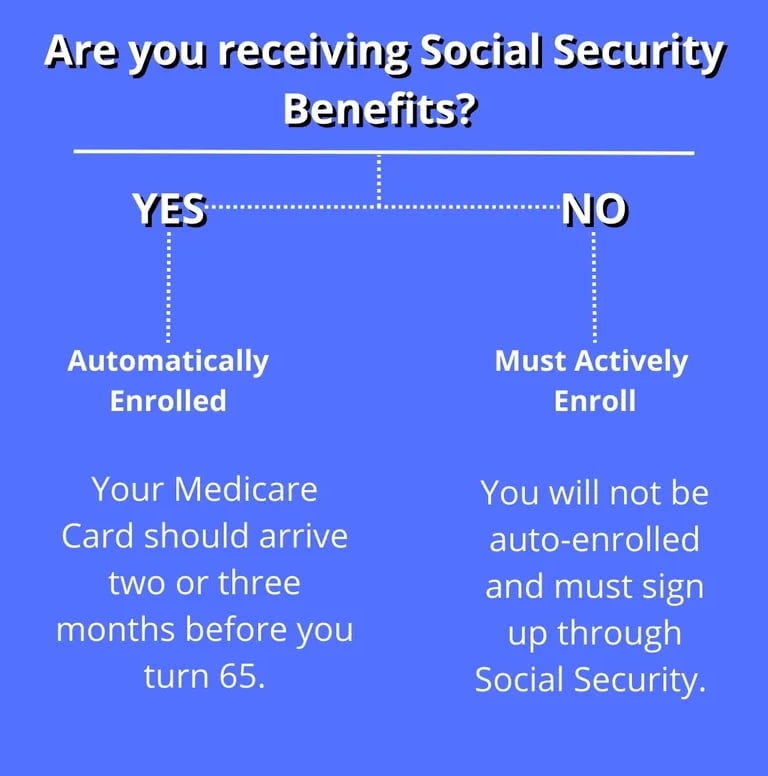What You Need to Know Before Your 65th Birthday


What is the Initial Enrollment Period?
Your Initial Enrollment Period (IEP) is a 7-month window around your 65th birthday when you can first enroll in Medicare:
3 months BEFORE your 65th birthday month
Your birthday month
3 months AFTER your 65th birthday month
Example:
If you turn 65 in June, your IEP runs from March 1 through September 30.
Why Your IEP Matters
Missing your IEP can result in:
❌ Lifetime late enrollment penalties added to your Part B and Part D premiums
❌ Gaps in coverage that leave you uninsured
❌ Limited plan options when you finally enroll
❌ Delayed coverage start dates
Don't risk it. Schedule a consultation with Kim to ensure you enroll on time.
What Does Medicare Cover?
Medicare has four parts, and understanding each is essential to making the right choice.
Important:
If you're receiving Social Security benefits, you'll be automatically enrolled in Part A when you turn 65.
SHOULD YOU ENROLL IF YOU'RE STILL WORKING?
If Your Employer Has 20+ Employees:
You may be able to delay Medicare enrollment without penalty if:
✅ You have creditable coverage through your employer
✅ Your employer's health plan is considered "primary" insurance
What you can do:
Keep your employer plan and delay Medicare
Enroll in Part A only (if premium-free) and delay Part B
Enroll in both Medicare and keep your employer plan
Important:
You'll have an 8-month Special Enrollment Period after you stop working or lose coverage to enroll without penalties.
If Your Employer Has Fewer Than 20 Employees:
You must enroll in Medicare during your IEP, even if you're still working.
Why?
Medicare becomes your primary insurance, and your employer plan becomes secondary. If you don't enroll, you could face:
❌ Late enrollment penalties
❌ Gaps in coverage
❌ Higher out-of-pocket costs
If You're Covered by a Spouse's Employer Plan:
Rules vary depending on the employer's size and plan requirements. Talk to your spouse's benefits manager to determine if you need to enroll at 65.
HEALTH SAVINGS ACCOUNTS (HSAs) & MEDICARE
Important: You Cannot Contribute to an HSA After Enrolling in Medicare
If you have a Health Savings Account (HSA), be aware:
❌ Once you enroll in any part of Medicare, you can no longer contribute to your HSA
✅ You can still use existing HSA funds for qualified medical expenses, including Medicare premiums, deductibles, and copays
Planning tip:
If you want to continue contributing to your HSA, you may choose to delay Medicare enrollment (if eligible).
QUESTIONS TO ASK YOUR EMPLOYER'S BENEFITS MANAGER
Before making any Medicare decisions, talk to your employer's benefits manager and ask:
How many employees does the company have?
(This determines if you can delay Medicare.)Is our health plan considered "creditable coverage"?
(This affects whether you can delay Part D without penalties.)Will my employer plan work with Medicare, or do I need to choose one?
(Some plans require you to drop employer coverage when you enroll in Medicare.)What happens to my coverage if I enroll in Medicare?
(Will your employer plan become secondary, or will it end?)Do I need to provide proof of creditable coverage when I enroll in Medicare later?
(You'll need this to avoid Part D penalties.)
COMMON MISTAKES TO AVOID
❌ Mistake #1: Missing Your Enrollment Deadline
The penalty:
Your Part B premium increases by 10% for each 12-month period you were eligible but didn't enroll. This penalty lasts for life.
The solution:
Mark your calendar and enroll during your IEP or Special Enrollment Period.
❌ Mistake #2: Assuming You're Automatically Enrolled
The truth:
Only people receiving Social Security benefits are automatically enrolled in Parts A & B. Everyone else must enroll manually.
The solution:
Don't wait for a Medicare card in the mail. Take action during your IEP.
❌ Mistake #3: Not Checking if Your Employer Coverage is Creditable
The penalty:
If your employer's drug coverage isn't "creditable" (as good as Medicare Part D), you'll face a Part D late enrollment penalty when you finally enroll.
The solution:
Ask your employer for a Notice of Creditable Coverage and keep it on file.
❌ Mistake #4: Enrolling in Medicare Without Understanding Costs
The surprise:
Medicare isn't free. You'll pay premiums, deductibles, copays, and coinsurance.
The solution:
Work with Kim to understand your total costs and find a plan that fits your budget.
HOW KIM HELPS YOU NAVIGATE TURNING 65
Kim's Turning 65 Consultation Includes:
✅ Personalized IEP timeline so you know exactly when to enroll
✅ Employer coverage review to determine if you can delay Medicare
✅ Plan comparison to find the best Medicare option for your needs
✅ Enrollment assistance to ensure you sign up correctly and on time
✅ Ongoing support for questions about claims, coverage, and plan changes
Best of all? Kim's services are 100% FREE.
She's compensated by insurance companies, not you.
Contact Kim: 816-436-9977
Kim Youngs
Address
7211 NW 83rd Street
Suite 145
Kansas City, MO. 64152